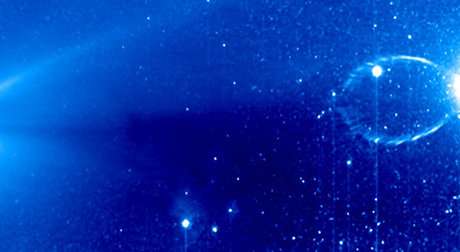Citizen scientists developing expertise on galaxy images

Two researchers from the University of Gothenburg have studied large amounts of data in a citizen science project that turns to volunteers for help classifying images of galaxies.
'We can see how interested volunteers have developed expertise that we didn't foresee,' says Dick Kasperowski, associate professor of theory of science and co-author of the study.
'We have studied how volunteers in the Galaxy Zoo project are mobilised by scientists and how their knowledge grows. It's quite surprising how some participants develop extensive expertise about how images of galaxies are created and how the instruments work,' says Thomas Hillman, associate professor of information technology and learning.
Hillman is from the Department of Education, Communication and Learning and Kasperowski is from the Department of Philosophy, Linguistics and Theory of Science, and their study The Epistemic Culture in an Online Citizen Science Project: Programs, Antiprograms and Epistemic Subjects has been published in Social Studies of Science.
Observations that does not fit the protocol
The possibility of discovering phenomena that nobody has ever seen before makes many volunteers eager to help classify large numbers of galaxies within the framework of the Galaxy Zoo project. Sooner or later, each volunteer will make an observation that does not fit the protocol. Then they will turn to the project's online discussion forum with hopes of having made a brand-new discovery. This is what happened to Dutch schoolteacher Henny van Arkel, who in 2009 discovered what scientists believe are remains of a quasar. As a result, van Arkel ended up co-authoring the scientific article that was written about the discovery.
However, most of the volunteers who think they may have made a new discovery are told by scientists that what they have seen is a mere artefact generated by the instrument that created the image in question. In some cases, they become interested in what an artefact is, and some even become skilled enough to be able to see what instrument was used to create a certain image.
'We have seen that a culture of shared learning and knowledge is created among people who hang out together online and discuss artefacts and how they can learn more,' says Hillman.
Based on 675 000 discussions
Hillman and Kasperowski's findings are based on 675 000 discussion threads retrieved from the Galaxy Zoo online forum.
'It's really easy to participate. All you need to do is classify galaxies according to a set protocol. In our study, we looked for cases where participants made observations that didn't fit the protocol. We assessed the intensity in the online forum and what people say there,' says Kasperowski.
The results of the study are important as they show how knowledge is developed by participants in this type of large-scale online project.
'For example, the particular factors that motivate participants. It is also interesting to see how citizen science projects, no matter how well-structured they are, also generate learning that is beyond a project's control,' says Hillman.
Next, Hillman and Kasperowski will study other citizen science projects, include in the humanities, with an aim to learn more about how participants develop knowledge and interests beyond the tasks that scientists and researchers originally mobilised them to perform.
'We have some preliminary findings showing that those types of participant activities can in fact lead researchers onto new paths,' says Kasperowski.
The study, titled The Epistemic Culture in an Online Citizen Science Project: Programs, Antiprograms and Epistemic Subjects, is available free of charge.
More information: Dick Kasperowski et al, The epistemic culture in an online citizen science project: Programs, antiprograms and epistemic subjects, Social Studies of Science (2018). DOI: 10.1177/0306312718778806
Provided by University of Gothenburg





















